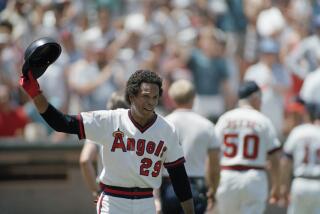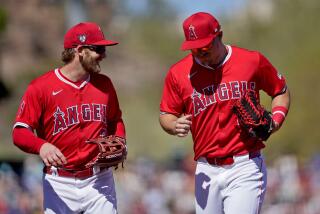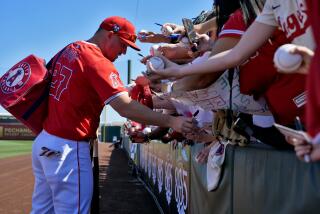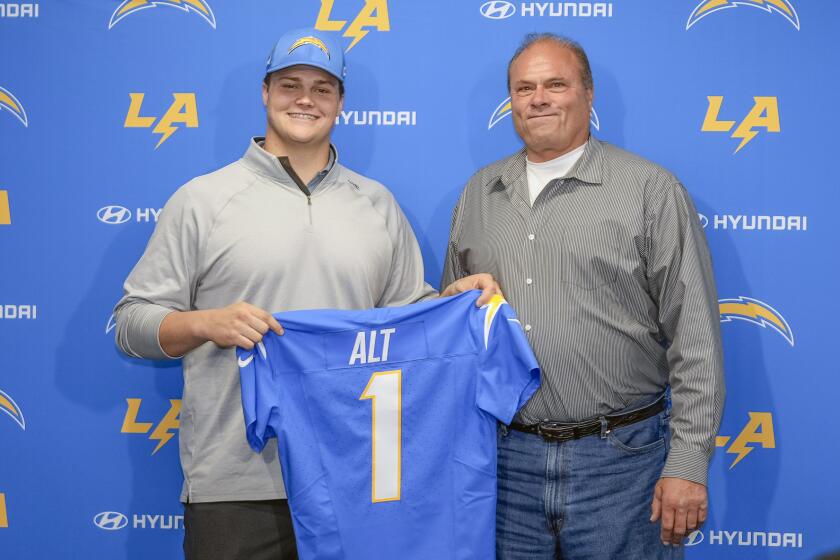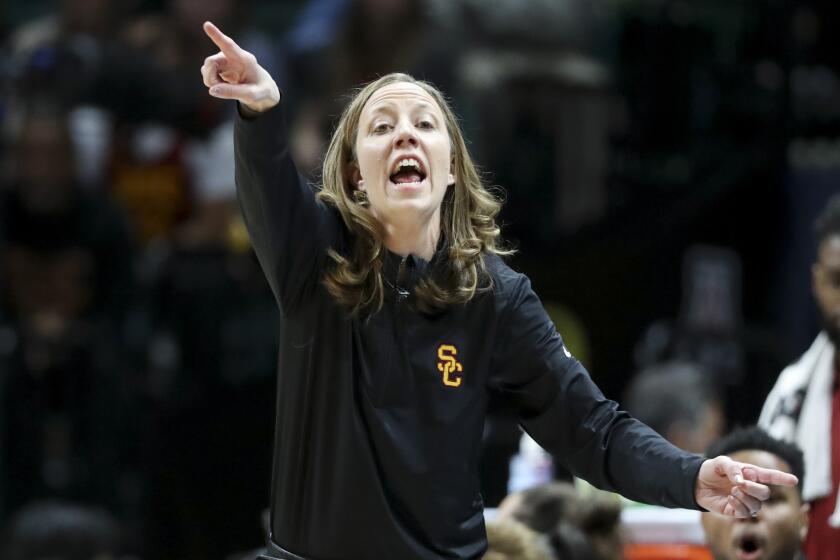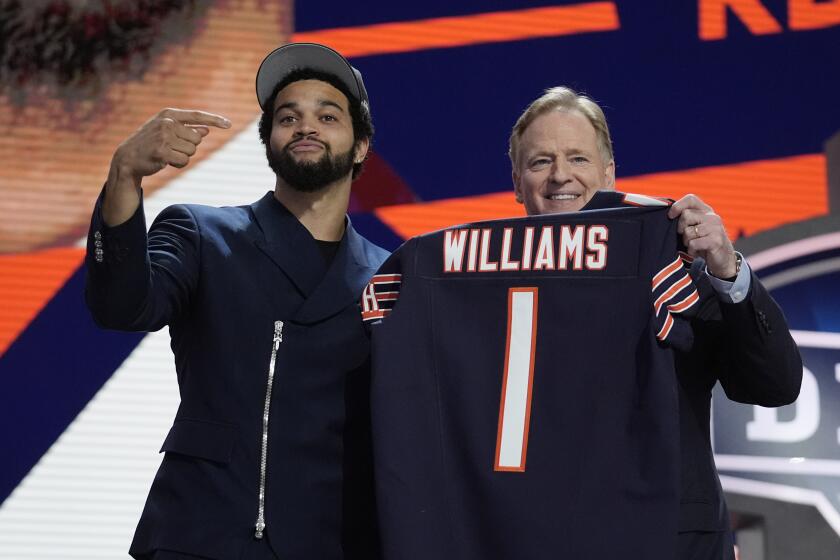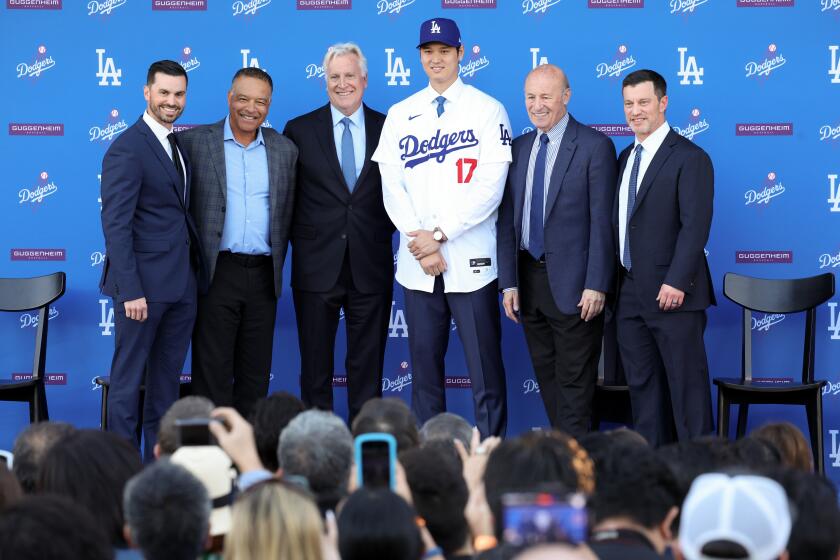Great Read: Trainer Rick Smith, Angels fixer-upper, is in the house — for 37 years
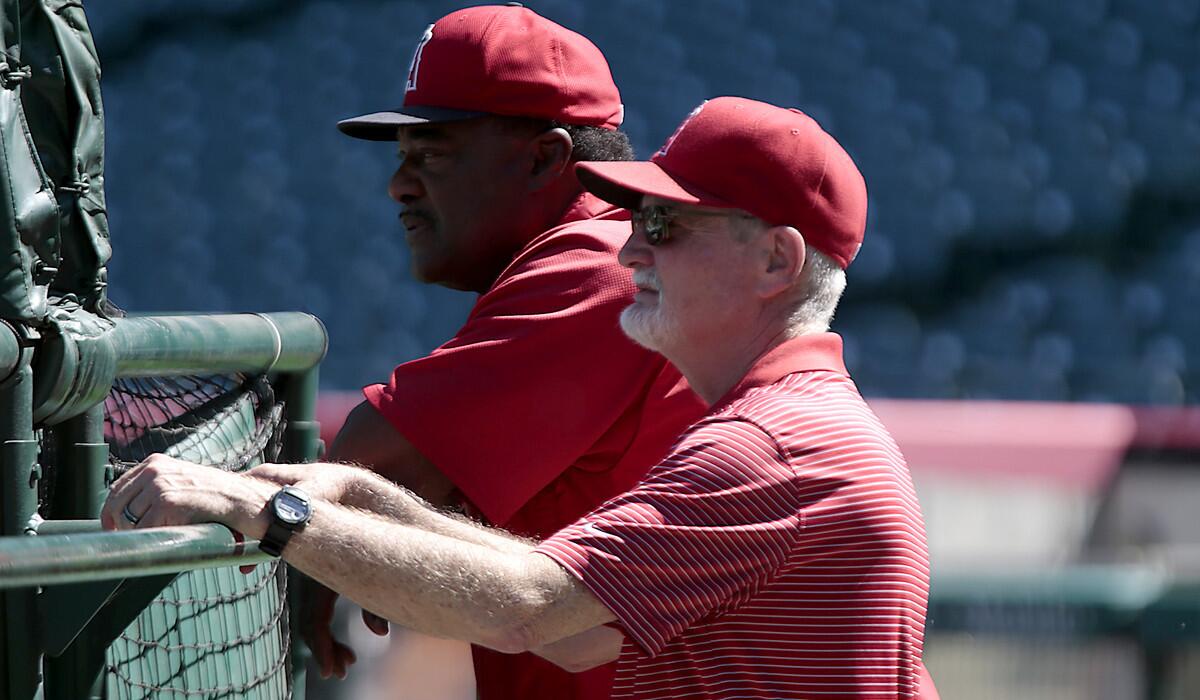
Rick Smith gulps black coffee from a travel mug as he bounces past the empty training room’s treatment tables and wall-sized photos of former players deep under Angel Stadium.
A slender man with gray whiskers and a quick smile, Smith is wrapped in a 5-foot-8 package that never seems to stop moving. He veers into his small office, the one overflowing with memorabilia that includes an autographed jock strap from retired National Hockey League star Teemu Selanne and, by the door, a photograph of the 1978 Angels.
That was the year Smith joined the Angels as an athletic trainer.
A few days into Smith’s first spring training with the team, pitcher Frank Tanana requested a massage.
Tanana extended his right arm and Smith worked up a sweat kneading the All-Star’s muscles.
The star-struck trainer had never attended a big league game, never even seen Tanana pitch.
“OK,” Smith recalled Tanana’s saying after half an hour. “Now you can work on the arm I pitch with.”
Smith shakes his head and grins. He still can’t help but laugh at the prank.
The 60-year-old fishes a dog-eared media guide out of a desk drawer and flips to his biography. His job is listed as athletic trainer, but that only hints at the full story of his 37 years in the big leagues with the Angels. The man everyone calls Smitty is a comedian, storyteller, team grandfather and philosopher.
When the Angels continue their best-of-five American League division series on Friday against the Kansas City Royals, Smith will take part in his 63rd postseason game. He’s missed just six regular-season games out of 5,875.
He has outlasted more than 600 players for the Angels, plus dozens more coaches, managers and executives.
Nothing about his job feels like work to him. Not the balms and massages, the whirlpool baths and stretches that he administers to help the Major League Baseball team endure the physical toll of eight months on the field.
He’s used to 18-hour days fueled by the training room’s espresso machine. He’s fine with returning home at 4 a.m. after being on the road. He shrugs off the foul ball that slammed into his left side during a game in 2007; it didn’t break any bones but left him hurting for months.
He’s not sure there’s a better feeling in baseball than the champagne and beer showers that followed the Angels’ World Series title in 2002. He wants to be drenched again. Soon.
::
Around 11:30 a.m. Friday, Smith will drive 10 minutes from his home to Angel Stadium in Anaheim.
He’ll ready the whirlpools and set out towels and training tape. Players will trickle in for treatment of nagging problems such as sore shoulders and tendinitis.
Smith will place a black bag that looks like carry-on luggage in the Angels’ dugout near the Gatorade jug. The emergency kit that he’s never had to use includes an automated external defibrillator and an auto-injector to deal with allergic reactions.
Spare moments are filled with more cups of coffee than Smith wants to count.
On game days, Smith keeps essentials of his work inside a black fanny pack strapped to his waist: gauze pads, eyedrops, scissors, fingernail clippers, Super Glue, pen light, bandages. They’re part of the defense against the wear on bodies from 162 regular-season games along with dozens more in spring training and the postseason.
“The best tools I still have are my hands,” Smith said. “But they’re old these days.”
During games, he’s content to sit in the corner of the dugout out of the way of foul balls and chat with Angels batting coach Don Baylor. Leaving the perch means something’s not right, like when pitcher Garrett Richards crumpled to the ground at Fenway Park in August with a torn patellar tendon in his left knee.
The job is as much about people as sprained ankles and torn ligaments, about reminding Richards in the midst of the pain that he’d get through the gruesome injury and pitch again, about hosting rookies for barbecues with his wife, Jannell, at their Tustin home to help them adjust to the big leagues.
“These guys are baseball players, but they’re human beings who have ups and downs,” Smith said.
When Baylor broke his right leg in a freak accident while squatting to catch a ceremonial first pitch at the Angels’ ballpark in April, Smith held his friend’s hand in the ambulance.
“Sometimes he takes care of you too much,” said Baylor, one of the toughest players Smith has encountered on or off the field.
The days, even the good ones that include a win and a couple of injured players making progress, don’t end for Smith until past midnight. Players need postgame icing. More stretching. But when Smith gets home, he falls asleep almost instantly, no matter the hour.
::
Next to the framed jock strap is the faded Rawlings glove that former Angels second baseman Bobby Knoop used in his final game. Knoop managed the double-A El Paso Diablos, then affiliated with the Angels. Smith, fresh out of the University of Texas El Paso in 1976, became the team’s athletic trainer.
“I always wanted to travel ... and wanted to be a doctor,” Smith said. “This is as good as it gets.”
At that moment, Angels Manager Mike Scioscia poked his head into the office. He wore an expression of mock seriousness.
“We can send you to some penal colonies if you want to travel,” Scioscia said.
They laughed.
Smith’s first trip with El Paso took 24 hours by bus to Little Rock, Ark. He wondered what he’d gotten himself into — the bare-bones equipment and training room was not much bigger than a bathroom stall.
“I thought he was probably like a lot of young college kids … crazy, wacky, full of life,” Knoop said, “but at the same time dedicated to what he did.”
Smith rattles off one story after the other about his formative years, frequently interrupting himself with chuckles.
One of his favorites involved Hall of Fame pitcher Nolan Ryan, who asked him for a No. 10 scalpel. The athletic trainer refused. He didn’t want to be responsible for the Angels ace’s slicing off a finger.
Ryan didn’t back down and, by Smith’s recollection, hinted the newly hired athletic trainer should provide the scalpel if he wanted to keep his job. Smith relented and gave him a new scalpel before each start so the pitcher could shave the calluses on his right hand.
Smith’s duties included repeatedly treating players for shoelace-related burns. Bert Blyleven used to set fire to the shoelaces of unsuspecting Angels teammates. One practice took an unfortunate turn when coach Jimmie Reese’s pants burst into flames.
“The story,” Smith said, “is never as good as the moment.”
There were stranger injuries. Thirty minutes before Dave Goltz was scheduled to start against the Boston Red Sox at Fenway Park, the pitcher sliced his right index finger to the bone on a toilet paper dispenser in the clubhouse. The cut required six stitches. Smith had to inform Gene Mauch, then the Angels’ taciturn manager, that his starter wasn’t available because of a restroom accident. The conversation didn’t go well.
Smith, though, is known for self-deprecating one-liners that lighten the mood.
“I’m a Hall of Famer,” Smith said. “I might leave out the El Paso part sometimes.”
That’s the El Paso Baseball Hall of Fame, which inducted him in 2007.
::
Last month, Smith boarded the team bus at Safeco Field as usual after the Angels played the Seattle Mariners. There was one problem. The man who keeps a daily to-do list in his right pocket forgot Jannell — who rarely travels with him during the season — at the stadium.
“Oh, my goodness, the guys hassled him,” she said. “I think I distracted him from his routine.”
Smith has never been the Angels’ head athletic trainer — Adam Nevala has that title — or pursued opportunities with other clubs. He professes no regrets. Smith looks you in the eye and in a sincere voice says he has the best job in the world.
“He crosses generations, crosses cultures,” said Tim Mead, Smith’s friend for 35 years and the Angels’ vice president of communications. “A lot of times when people meet him, they feel like they’ve known him forever.”
Amid the memorabilia in Smith’s office is a framed saying: “Life’s journey is not to arrive at the grave safely in a well preserved body. But rather to skid in sideways, totally worn out, shouting ... ‘What a ride!’”
Smith tries to live those words, one of the reasons he isn’t still for long. He jiggles his left leg. Sips coffee. Taps your knee to punctuate jokes. Every few minutes, he gets up and scurries into the training room to keep an eye on his players.
Twitter: @nathanfenno
More to Read
Get our high school sports newsletter
Prep Rally is devoted to the SoCal high school sports experience, bringing you scores, stories and a behind-the-scenes look at what makes prep sports so popular.
You may occasionally receive promotional content from the Los Angeles Times.
